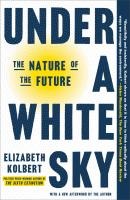NATIONAL BESTSELLER • The Pulitzer Prize-winning author of The Sixth Extinction returns to humanity's transformative impact on the environment, now asking: After doing so much damage, can we change nature, this time to save it?
RECOMMENDED BY PRESIDENT OBAMA AND BILL GATES • SHORTLISTED FOR THE WAINWRIGHT PRIZE FOR WRITING • ONE OF THE TEN BEST BOOKS OF THE YEAR: The Washington Post • ONE OF THE BEST BOOKS OF THE YEAR: Time, Esquire, Publishers Weekly, Kirkus Reviews • "Beautifully and insistently, Kolbert shows us that it is time to think radically about the ways we manage the environment."-Helen Macdonald, The New York Times
With a new afterword by the author
That man should have dominion "over all the earth, and over every creeping thing that creepeth upon the earth" is a prophecy that has hardened into fact. So pervasive are human impacts on the planet that it's said we live in a new geological epoch: the Anthropocene.
In Under a White Sky, Elizabeth Kolbert takes a hard look at the new world we are creating. Along the way, she meets biologists who are trying to preserve the world's rarest fish, which lives in a single tiny pool in the middle of the Mojave; engineers who are turning carbon emissions to stone in Iceland; Australian researchers who are trying to develop a "super coral" that can survive on a hotter globe; and physicists who are contemplating shooting tiny diamonds into the stratosphere to cool the earth.
One way to look at human civilization, says Kolbert, is as a ten-thousand-year exercise in defying nature. In The Sixth Extinction, she explored the ways in which our capacity for destruction has reshaped the natural world. Now she examines how the very sorts of interventions that have imperiled our planet are increasingly seen as the only hope for its salvation. By turns inspiring, terrifying, and darkly comic, Under a White Sky is an utterly original examination of the challenges we face.


